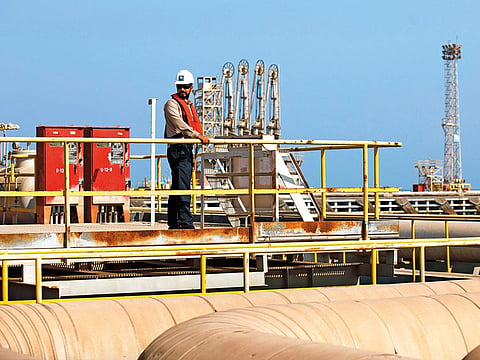Demand for Aramco’s bond at ‘north of’ $30 billion
Transaction is expected to attract demand from both EM and investment-grade buyers

Riyadh: Demand for Saudi Aramco’s inaugural international bond, which will be issued this week, is higher than $30 billion (Dh110.1 billion), Saudi Energy Minister Khalid Al Falih said on Monday.
State-owned Saudi Aramco, the world’s largest oil company, met investors last week in a global bond roadshow ahead of its planned issuance, which Falih previously said would be in the $10 billion range.
The transaction is expected to attract demand from both emerging markets and investment-grade buyers, as although Aramco is state-owned its finances put it in the same league as independent international oil majors like Exxon and Shell.
Speaking at an event in Riyadh, Falih said he believed demand for the bond was “north of” $30 billion.
The deal will be closed on Wednesday, he added.
Aramco last year postponed a planned initial public offering to 2021.
“The success of this bond issue will be the litmus test and a crucial precursor for the anticipated Aramco IPO within the next two years,” said Salah Shamma, head of investment, Mena equities, at Franklin Templeton.
The bond, announced last week, follows Aramco’s agreement to buy a 70 per cent stake in petrochemicals firm Saudi Basic Industries (Sabic) from Saudi Arabia’s Public Investment Fund in a deal worth $69.1 billion.
Al Falih said on Monday he hopes Aramco’s Sabic acquisition will be completed within six months.
In a company presentation last week, however, the company said the deal will close in 2020.
The transaction will give the PIF firepower to proceed with its plans to create jobs and diversify the largest Arab economy beyond oil exports.
Falih said in addition to Sabic, there will be other assets, “non-strategic assets”, that PIF may exit.
“I think the vision of the PIF goes way beyond the $69 billion that Saudi Aramco will provide to the PIF, which is very bold, it’s global and domestic at the same time,” he said.
PIF has invested in ride-hailing firm Uber Technologies and in electric carmakers Lucid Motors and Tesla.
“So don’t be surprised, just as bold as they were in entering some of these investments, that they do exit,” said Al Falih.
PIF will be looking globally to acquire emerging companies in emerging industries, said the minister, “to create value for them, but at the same time to leverage those acquisitions and investments for the benefit of the kingdom’s strategy.”



